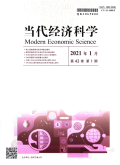当代经济科学2024,Vol.46Issue(4):41-54,14.DOI:10.20069/j.cnki.DJKX.202404004
从"竞争性储蓄"到"竞争性投资":再论性别失衡对中国家庭金融决策的影响
From"Competitive Saving"to"Competitive Investment":Revisiting the Impact of Gender Imbalance on Chinese Households' Financial Decision
摘要
Abstract
Despite low financial literacy among Chinese residents,the proportion of families participating in risky financial investments has risen over the past decade.What factors and mechanisms drive this phenomenon?This paper explores the role of gender imbalance in this context.China faces the world's most severe gender imbalance,leading to a"male squeeze"in the marriage market.Building on the"competitive savings"theory by Wei&Zhang(2011,JPE),this article argues that as the financial system develops and the supply of various risky financial assets expands,traditional risk-free savings struggle to maintain and grow wealth.Consequently,Chinese families are increasingly turning to risky financial investments to enhance the competitiveness of their unmarried sons in the marriage market through higher income and wealth. This paper employs data from three rounds of the China Household Finance Survey(CHFS)in 2015,2017,and 2019 to identify causal relationships using a generalized difference-in-differences model.This model uses information on whether a family's first child is male and the gender ratio differences in the family's province.The study finds that:(1)In provinces with higher gender imbalance,families with sons are more inclined to participate in financial markets and hold more risky assets,though no evidence of"competitive real estate investment"was found;(2)Families with low financial knowledge and unmarried sons are more sensitive to gender imbalance in their risky financial decisions. This paper contributes to the literature in three ways:First,by combining three rounds of CHFS data(2015,2017,and 2019)to construct a large,up-to-date sample,it better reflects the dynamics of China's household financial behavior.Second,it examines family involvement in the stock market,various risky financial decisions,investment intensity,and real estate investment willingness,offering a comprehensive depiction of how gender imbalance affects household financial behavior.Third,it conducts heterogeneity tests based on financial knowledge and the age of unmarried sons,enriching the research findings. The findings reveal that Chinese families'involvement in risky financial markets due to gender imbalance may be driven by the allure of high returns,potentially overlooking hidden risks.The Chinese government should promote financial literacy and investor education among residents and emphasize rational investment participation.This approach can effectively mitigate risks from grassroots participants and ensure the stability and healthy development of the financial system.关键词
性别失衡/竞争性储蓄/竞争性投资/风险金融投资/婚恋市场/家庭金融/金融知识Key words
gender imbalance/competitive savings/competitive investment/risky financial investment/marriage market/household finance/financial literacy引用本文复制引用
林志帆,廖雯珺..从"竞争性储蓄"到"竞争性投资":再论性别失衡对中国家庭金融决策的影响[J].当代经济科学,2024,46(4):41-54,14.基金项目
北京师范大学引进人才科研启动项目(310432101). (310432101)

